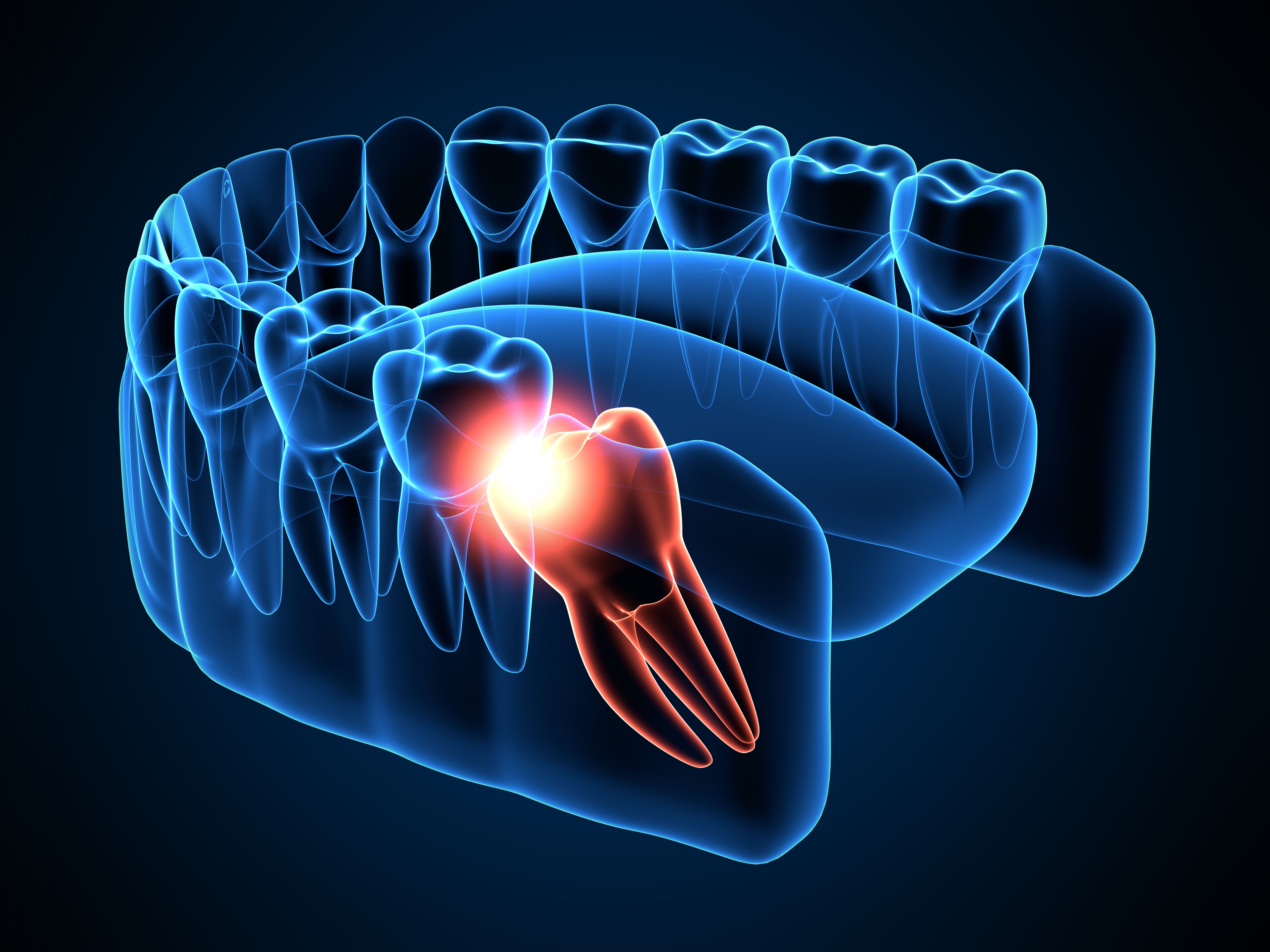
What Are Wisdom Teeth?
Third molars, or better known as wisdom teeth, begin to develop between the ages of seven to ten years old. Your orthodontist or dentist monitors the development of these molars and will advise extractions before full development of the tooth is complete. Usually the best time to have the third molars extracted is usually between the ages of thirteen to twenty-five years old, but does very patient to patient on development of the third molars.
Majority of people do not have enough spacing in their upper and lower jaw for the popper eruption of the third molars. Some impacted molars can cause sensitivity to the surrounding gums and teeth, bone loss, damage to surrounding teeth, and more. If the third molars are asymptomatic, it is ideal to have them removed to prevent future issues that could occur like infection, decay, or cyst that can cause bone loss.
In regards to wisdom teeth, is it always a good idea to have a consultation. A review of your health history will be completed. Imaging will be taken, and an evaluation given by your provider to determine the best treatment plan for you. While there are different levels of impaction, our doctors will explain the pro’s and con’s of extraction and if you are a good candidate. There are different factors like age, tooth development, and possible surrounding damage that will indicate if extraction of the third molars are the right treatment for you. Our insurance coordinator will review the cost of the procedure following the consultation. Fees vary patient to patient depending on levels on implaction, sedation, and what your insurance covers.
If you have pre or post operative questions regarding wisdom teeth extraction please call our office.
Wisdom Tooth extraction
The day of wisdom tooth extraction procedure can cause anxiety for some. We do our best to put patients at ease and make them comfortable before the procedure begins. Our team at Dallas Surgical Arts are all CPR/First Aid certified and our clinical staff are certified (DAANCE) and trained in anesthesia care and management. At your consultation, you will be given different options of sedation:
- Local anesthesia - the area around the extraction site is numb but you are fully aware and awake. You can drive yourself home if this is the anesthetic route you choose.
- Local anesthesia with Nitrous Oxide - Also known as laughing gas, is a useful tool to help keep patients calm and relaxed. You are still awake and aware of all that is going on during the procedure. You can drive yourself home if this is the anesthetic route you choose.
- IV Sedation - An IV is placed in the arm or hand and sedation medication is given through the IV. Similar to a colonoscopy or also known as a twilight sedation, you are asleep and unaware of the procedure when it’s taking place (local anesthesia is used during IV sedation). It is important that if you decide to proceed with IV Sedation you have nothing to eat or drink after midnight the night before your procedure, this includes water in the morning. It is not safe to have any solid food or liquids ingested at least eight hours prior to sedation. The procedure will be rescheduled if the fast is broken, our patients health and safety is our priority.
On the day of your procedure one of our surgical assistants will bring you back to our procedure room. We will confirm that the patient has had nothing to eat or drink (NPO) and allergies/health conconsers are known. EKG monitors, blood pressure, pulse oximeter, oxygen, and IV are placed, and vitals are taken to confirm that patients are healthy and ready for administration of sedation. The wisdom tooth procedure usually takes about an hour but can vary from patient to patient depending on the difficulty of the teeth and recovery time needed for the patient. It is important to have an adult with the patient to drive them home after the procedure and monitor the patient as they recover. It is normal for the patient to be lethargic for the remainder of the day. The patient will be biting on gauze to help control and stop the bleeding from the sockets. A slow ooze of blood is normal for the first 24-48 hours after your procedure. Post-operative instructions are given and explained on the day of the procedure so that you feel comfortable with post operative care before you leave our office. If any questions arise or symptoms below occur please call our office.
With any surgery there are always risks, the risks associated with wisdom teeth will be reviewed at your consultation. Not every patient will have all the same risks, however some may include:
- Damage to the sensory nerve, this nerve can be at risk with the lower wisdom teeth that have developed roots. This nerve gives sensation to the lower jaw, lip, chin, and the anterior gums. Some numbness post operatively does not mean you will have permanent damage and usually resolves gradually on its own. It is possible to have permanent nerve damage, patients at higher risk will be consulted on this at their consultation.
- Sinus communication, this is a risk for upper wisdom teeth, when upper wisdom teeth are impacted high in the upper jaw or have long roots. This is when a small hole in the sinus occurs from the tooth being at the sinus cavity wall. If this occurs the patient will be informed and put on a sinus precaution. This means that for about two weeks you will be advised to avoid blowing your nose and sneezing with your mouth open. More often than not a communication will resolve on its own. It is possible, but very rare, that a surgery to close the communication might be needed.
- Dry socket is the complication that is more common after wisdom teeth extraction. This does not mean everyone will experience dry socket. After extraction a blood clot forms, similar to how a scab forms when injured on other areas of the body. Dry socket is when the blood clot becomes dislodged prematurally from the socket. This will leave the bone exposed which creates a dull throbbing type pain in the extraction site. If dry socket is to occur it will likely be about three to seven days after the extraction. Smoking, certain medications, spitting, and bad hygiene are some of the causes of dry socket. Symptoms of dry socket can last around seven days. Additional medication or a dressing might be needed to help alleviate pain.
- Infection can occur after any surgery. If post operative pain and swelling has not improved after the first three to four days, this could be a sign of dry socket or infection. Common symptoms of infection are increased swelling and pain, discolored oozing, a bad taste coming from the site, and fever.
If infection is present an antibiotic will be prescribed. Complications from infection are possible and additional surgery may be needed to drain and debride the area.
-
Patient FocusedYour comfort and care is at the top of our list. Our team makes it a point to provide each patient with top notch care.
-
Comprehensive ApproachSpecializing in oral maxillofacial surgery as well as reconstructive surgery allows us to accomplish your overall goals.
-
Individualized CareWe treat each of our patients as an individual, and provide care according to their specific needs.
-
Innovative TechnologyWe are cutting-edge and use the most advanced technology and techniques.

-
“Thank Dallas Surgical Arts for a staff that is phenomenal!”
Amy H. -
“I look forward to more outstanding results.”
Roslyn G. -
“Will most definitely return here if I need anything else done in the future. <3”
Heather M. -
“The experience could not have gone more smoothly.”
Alexandra C. -
“We would for sure be back for any other needs and are so thankful for Dr. Sanovich and his staff!”
Laura M.


